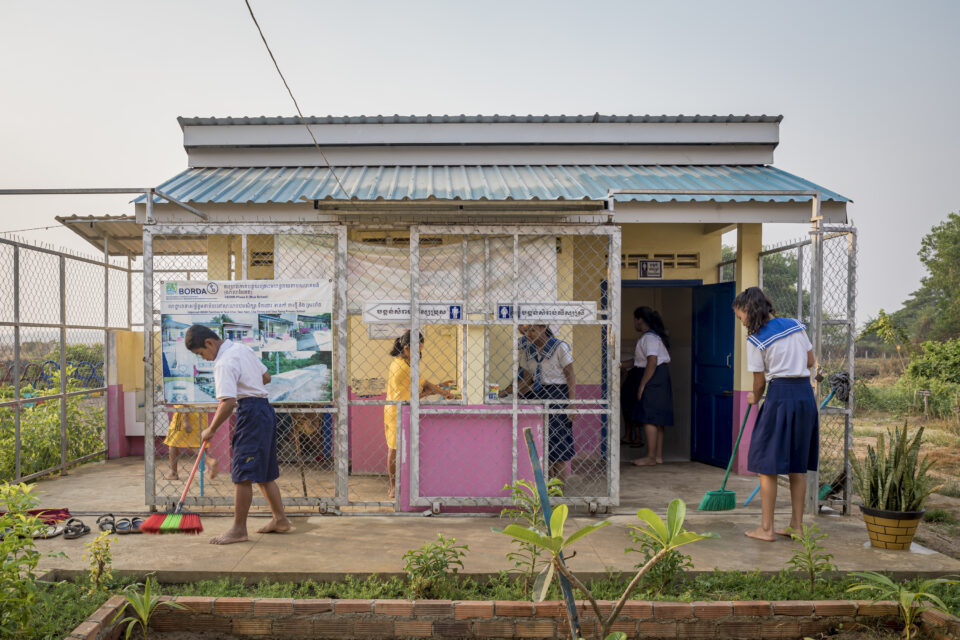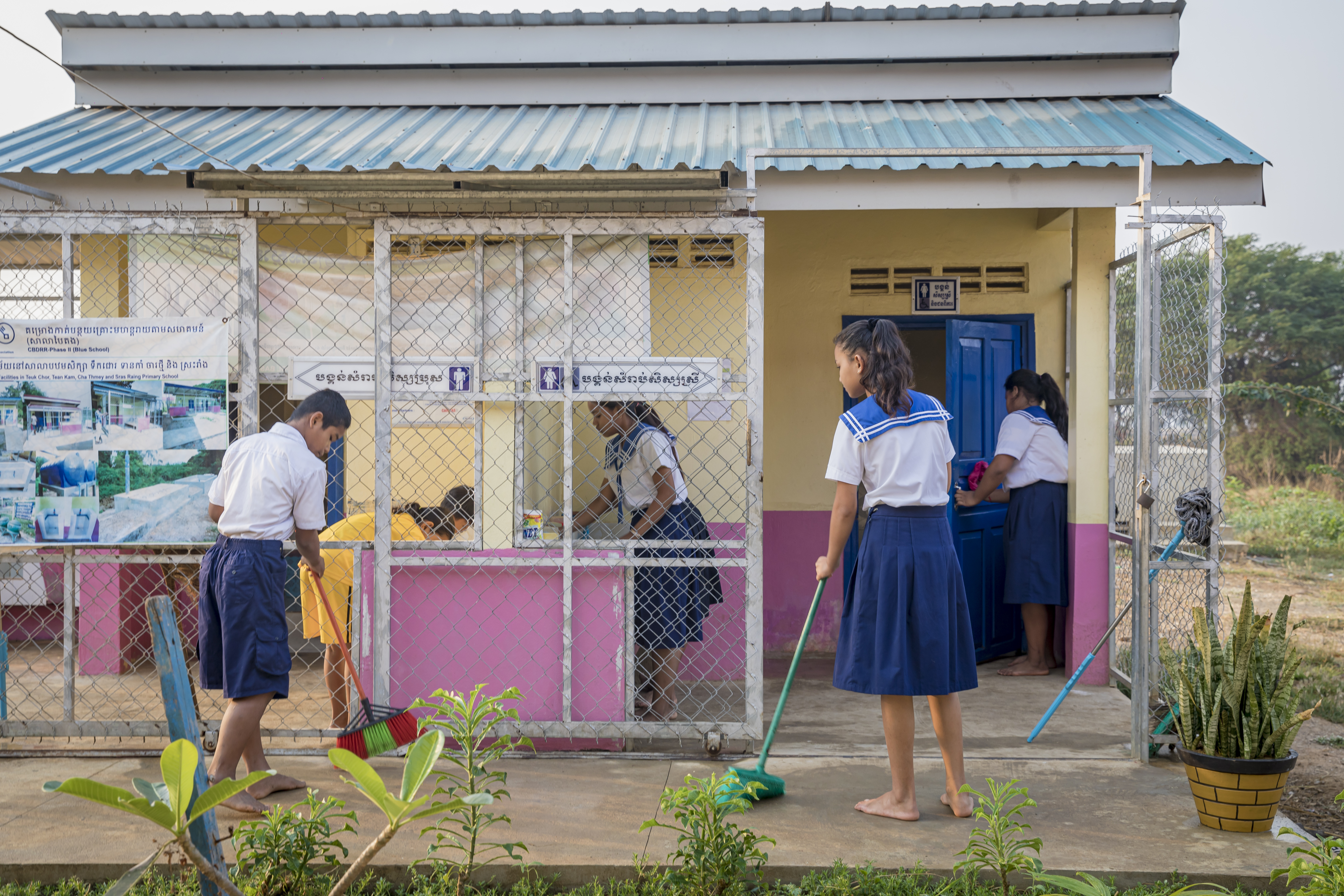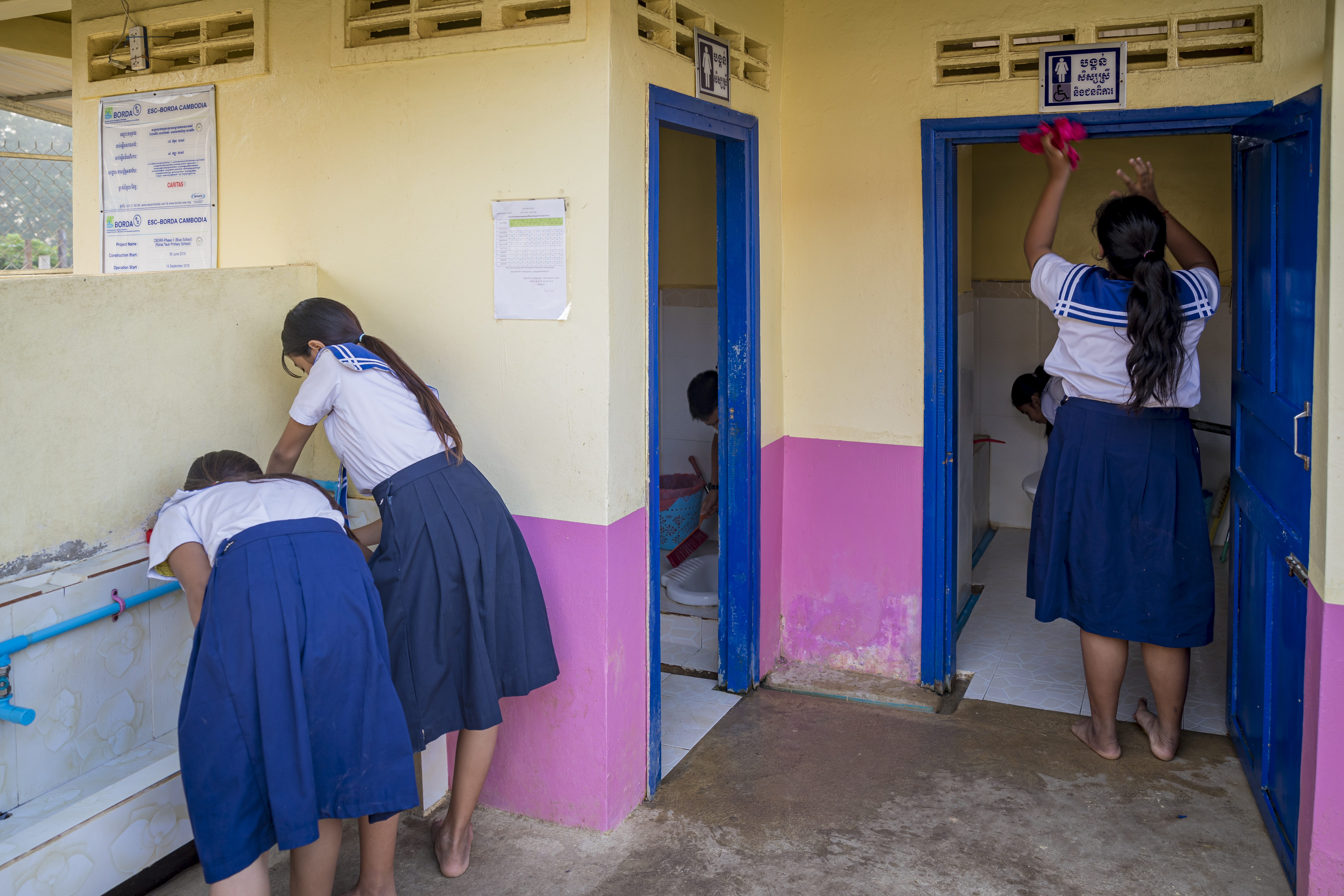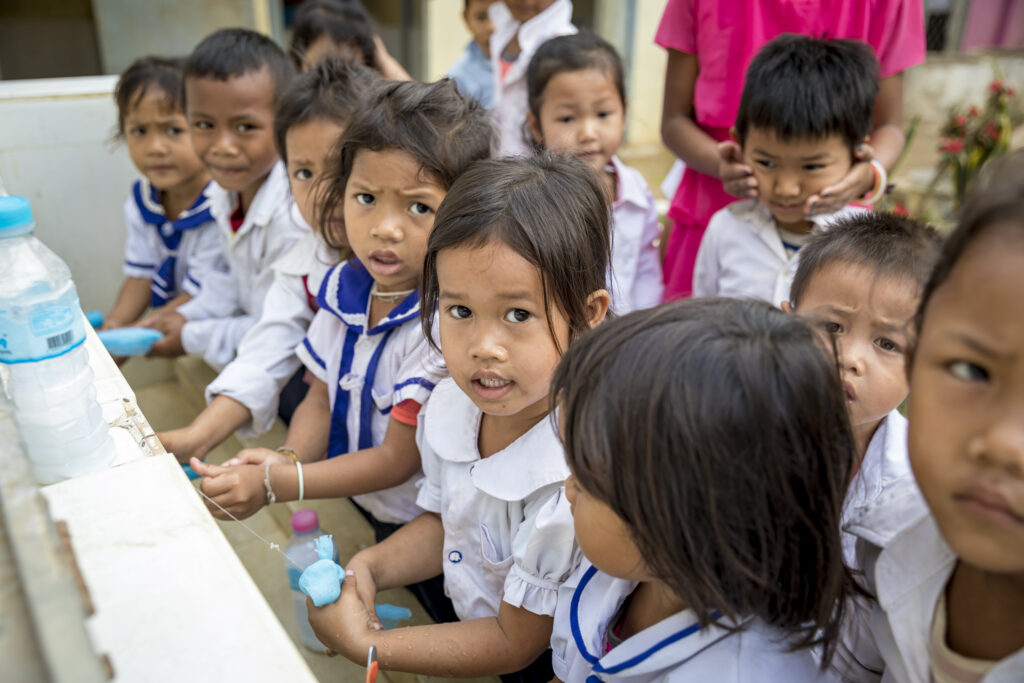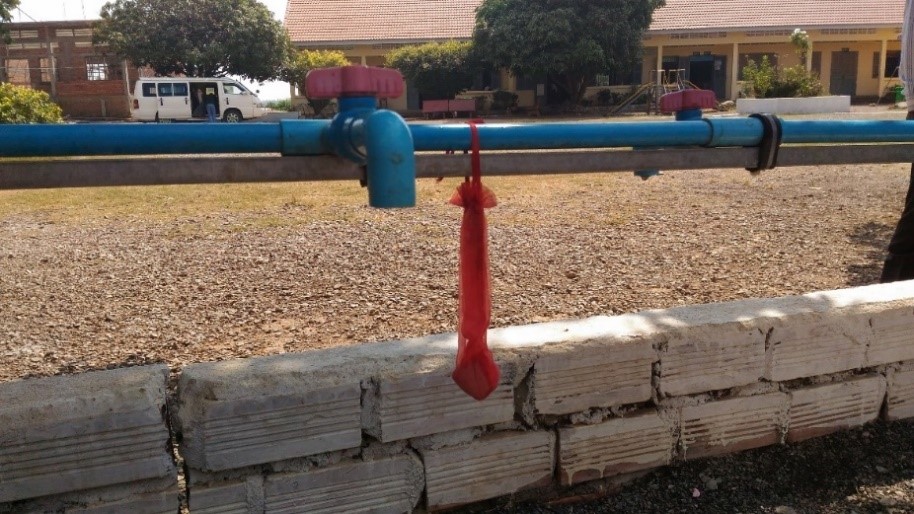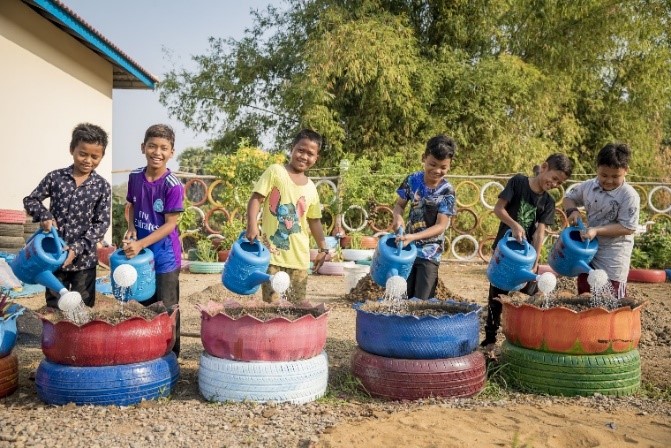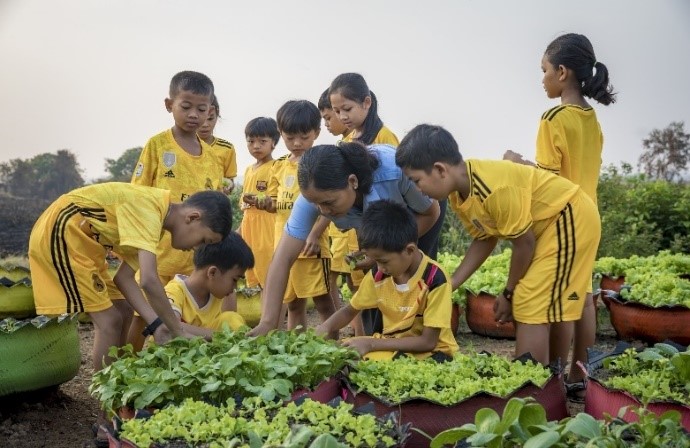Since 2018, Caritas Switzerland has been implementing the Swiss Water and Sanitation Consortium’s Blue School approach in Cambodia, contributing to the development and correct use of sustainable drinking water and sanitation facilities, as well as the application of good hygiene practices. Embedding the project into a community-based disaster risk reduction project further improved the awareness of school children for the linkages between water, health, sanitation, the environment as well as climate change risks. Sensitizing school children and communities on the importance of hand washing practices also helped the communities in coping with the COVID-19 pandemic.
Lack of clean water and sanitation is still a challenge in Cambodian primary schools. 30% of Cambodian schools do not even meet the minimum standards according to the government’s Three Star Approach, meaning that these schools lack any sanitation or handwashing facilities. Hygiene related diseases like diarrhea, respiratory tract disease, worm infestation and caries are the consequences. The national government has set ambitious goals to make primary schools open defecation free by 2023.
Caritas Switzerland’s Blue School pilot project started in 2018 and is located in Cambodia’s North Western Banteay Meanchey province. While provincial officials are highly supportive of WASH related interventions, the harnessing of government funding for concerted action is still a big challenge. Against this background, the involvement of representatives of the Ministry of Education as well as the alignment of the Blue School approach with national standards was crucial in supporting the long-term sustainability of the project activities.
After only two years, all nine pilot schools have successfully managed to integrate the Blue School approach in their annual school curricula and were awarded at least two stars based on the government’s Three Star Approach. The lessons made from the pilot phase are now integrated and applied in the third phase of the Swiss Water and Sanitation Consortium, benefitting 45 Blue Schools in Cambodia. A few of the key lessons learned are summarized in the following.
Sanitation Infrastructure – Build on What is Already There
In the Cambodian Blue School project, sanitation infrastructure was adapted to the requirements of each school compound. Wherever possible, existing toilets and handwashing facilities were rehabilitated. One of the lessons learned was that it may not always be necessary to construct new infrastructure. Older but still functioning infrastructure can be rehabiliated. In the current phase, 29 schools are targeted for sanitation facility construction or renovation, with the second round of constructions starting in spring 2021 for another 19 schools.
Design Smartly and Inclusively
For the design of new toilet facilities, the project used a functional and inclusive design developed by BORDA, the Bremen Overseas Development Agency, accounting for the needs of disabled children. According to the project team, a ratio of 1 toilet for 50 boys, respectively girls, has been deemed sufficient for the local context. The handwashing facilities were constructed in such a way that children need to pass in front of it before they leave.
Create Regular Group Trainings on Good Hygiene Practices
The practice of good hygiene and sanitation behavior – including hand washing with water and soap, as well as the proper use and maintenance of latrines and urinals – is covered in the Blue Schools Kit that provides teachers with various practical exercises that can be used for different age groups. In order to remind the students to keep the good practice of regular hand washing, the Cambodian pilot schools decided to include weekly group hand washing activities in the school schedule. As a result, teachers report that students developed the habit of washing their hands every time before taking a snack or a meal and after visiting the toilets.
‘My school is my second home. I learn a lot here, for example how to clean my toilet and how to wash my hands, how to reduce and to reuse waste.’
11-year-old female student Kaing Sonory from Rohat Toek Primary school
The Importance of Hand-Washing Facilities in the Fight Against COVID-19
In the face of COVID-19, hand-washing facilities have received 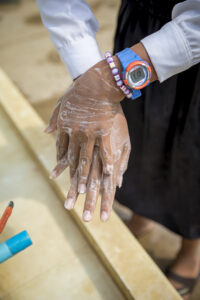 additional attention and importance. In Cambodia, the government has developed guidelines for schools, which besides the wearing of masks also focus on the use of soap and regular hand washing. School students as well as communities have been sensitized about hygiene practices and are aware that regular hand washing with soap is one of the most efficient practices to prevent infection.
additional attention and importance. In Cambodia, the government has developed guidelines for schools, which besides the wearing of masks also focus on the use of soap and regular hand washing. School students as well as communities have been sensitized about hygiene practices and are aware that regular hand washing with soap is one of the most efficient practices to prevent infection.
Toilet Cleaning Schedule and Compliance Group
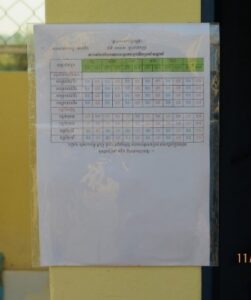 School principals and teachers found that developing a simple toilet cleaning schedule and placing it prominently on a wall in the sanitation facilities would strongly improve the adherence to the cleaning plan. Another innovation in the project has been the formation of a ‘compliance group’, monitoring the effectiveness of toilet operation and maintenance. The same mechanism is also used for group handwashing and school garden activities.
School principals and teachers found that developing a simple toilet cleaning schedule and placing it prominently on a wall in the sanitation facilities would strongly improve the adherence to the cleaning plan. Another innovation in the project has been the formation of a ‘compliance group’, monitoring the effectiveness of toilet operation and maintenance. The same mechanism is also used for group handwashing and school garden activities.
Community Involvement Supports the Maintenance and Protection of Sanitation Facilities
In the Blue School projects in Cambodia, the communities have been strongly involved in the operation and the maintenance of the WASH facilities. As an example, the communities support in locking toilets after the closing of schools, doing repair and maintenance work and monitoring the soap stocks at the hand washing facilities. Additionally, schools have come up with creative solutions such as ‘plastic socks’ to prevent the theft of soaps. A great co-benefit of this community involvement is the increased diffusion of Blue School practices into communities.
‘When children learn good WASH practices at school, they benefit from better health and well-being, both mentally and physically, and they bring these lessons learned and practices to their homes, contributing to the education of their parents and their communities.’
Vice Provincial Governor of Banteay Meanchey
School Gardening Sensitizes Children to Environmental and Climate Issues
The practical involvement of the school children in school gardening, waste management as well as lessons on the water cycle and sustainable land management practices makes children aware at an early age of the complex interrelations between sanitation, health and environment. In a playful manner, the children are taught about vegetable gardening, tree planting and how to use water in an efficient and sustainable manner when water shortages occur during the dry season.
Cross-Financing of Sanitation Facilities Through Sales of Blue School Gardens
In some schools, school gardens have proven to be so successful, that school principals were able to generate additional financial resources from the selling the produce – fruits, vegetables or even fish – from the school garden and the school pond, which were then used for the maintenance of the sanitation facilities.
Integrating Experts from Community Disaster Risk Reduction Project into Blue Schools
One constraint in the development of the environment component of Blue Schools can be the lack of basic principles and knowledge on the water cycle and watershed management by teachers. To address this issue, the Cambodian Blue School projects have started to include disaster risk reduction (DRR) experts into the schools, which was easily implemented given the embedding of the Blue School component into a broader community-based DRR project. As a result, teachers and students improved their knowledge on the importance of the sustainable management of upper, middle and lower water catchment areas.
Improved Resilience of Schools and Sanitation Facilities to Extreme Weather Events
The embedding of the Blue Schools into the community DRR project not only made the integration of DRR experts into Blue Schools possible, but it also contributed to making schools more resilient against extreme weather events. The establishment of DDR village committees, the development of integrated risk management plans as well as the promotion of sustainable, climate-smart agricultural practices has prepared rural communities as well as the belonging schools for extreme weather events and climate risks.
The experience in Cambodia has shown that the Blue School approach can play an effective role in providing safe drinking water, well-maintained latrines and good hygiene practices, as well as providing students with a sound understanding of environmentally friendly practices they can replicate at home. In the framework of the currently implemented third phase of the Swiss Water and Sanitation Consortium, the lessons learned from the piloting phase are upscaled and applied in 45 schools in Cambodia.

